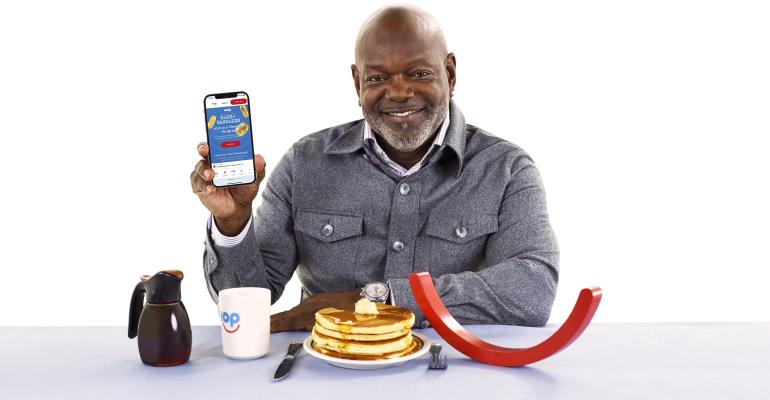In the past several years we’ve seen a staggering growth of loyalty program launches and iterations from restaurant brands, and that trend continues as consumers become more tethered to their mobile devices. In the past year alone, we’ve seen new or updated loyalty programs from brands like KFC, Just Salad, CAVA, and Domino’s Pizza.
As part of loyalty’s evolution, programs are shifting away from a discounting-focused model to more of a personalized, surprise-and-delight-rewards-focused model. We’re also starting to see that such mobile-based programs aren’t just for coffee concepts or lunch spots anymore; more full-service concepts are jumping on board, and, like their limited-service peers, they are also reaping the benefits of higher frequency and check from their members. Of course, loyalty isn't a new concept for full-service brands. Chili’s launched MyChilis in 2015, for instance, while Bloomin’ Brands launched its loyalty program about a year later and made it available for all of its brands. But casual dining category players are starting to evolve their program’s capabilities to be more robust and, of course, more digital. One example here is The Cheesecake Factory, which unveiled its new loyalty program last year, including access to reservations, complimentary slices of cheesecake for members’ birthdays, and even integration into the DoorDash platform to also make offers available there. During Cheesecake’s Q4 earnings call last month, CEO David Overton said the program is so far exceeding internal expectations.
“We remain encouraged by the level of member activity and engagement we are seeing,” he said. “We are continuing to test acquisition tactics and activation campaigns to better understand the key elements that are resonating with rewards members and most effectively increasing membership enrollment, engagement and driving frequency.”
He added that the company is “centrally focused” on the rewards program for its marketing approach this year.
Meanwhile, Cracker Barrel launched its rewards program in September and during the company’s Q2 call last month, new CEO Julie Masino said there have been strong enrollment levels so far.
“We are encouraged by the engagement, feedback, and response rates we’re seeing,” she said, adding that loyalty members accounted for nearly 50% of the chain’s Thanksgiving heat-and-serve sales, which was partially driven by the program’s ability to directly engage with them. Therein lies the impetus behind these loyalty launches.
“Today, we’re spending a lot in mass marketing. We are doing some targeting and digital and so on, but it’s still a version of mass marketing,” CFO Craig Pommells told analysts. “As the loyalty program continues to scale, we’ll be able to talk to guests in a much more targeted and one-to-one way.”
Cracker Barrel wouldn’t share enrollment numbers quite yet, but executives noted it’s “ahead of plan” and is driving incremental traffic and “strong engagement.”
“The power of loyalty in digital is realized through the scaled collection of guest data, capitalizing on the behavioral insights through robust test and learn campaigns, and delivering individualized experiences that drive engagement, incremental sales and increased visitation. With our recent success, I believe we can do more to faster realize these goals,” Masino said. “We continue to believe the program, with its easy-to-use and engaging design and rewarding value, will be a meaningful brand differentiator and traffic driver over the long-term.”
This is likely what Red Robin is also going for as it gears up for its loyalty program relaunch this year. The current program has over 13 million members and has historically been discount focused.
“We intend to transform our program into a VIP-like experience, delivering relevant messaging to our members and ultimately fostering a new generation of Red Robin ambassadors,” CEO G.J. Hart told analysts last month. “We’re excited to transition to a points-based system that makes it easier for our most loyal guests to earn rewards, giving them incentive to visit us more often.”
A full-service case study for successful loyalty program evolution can be found at IHOP, which recently reported its 11th consecutive quarter of positive same-store sales and outperformed the category on traffic. The chain’s International Bank of Pancakes loyalty program was launched in March of 2022 and now counts 8 million people. According to Dine Brands CEO John Peyton, the IHOP loyalty app is being downloaded 8,000 times a day and those members visit on average nearly twice as much as non-members and spend about 5% more.
“I believe there is much more upside here, notwithstanding the quick growth of the program – loyalty only accounts for approximately 6.5% of total sales for IHOP, up from less than 3% in 2022,” he told analysts last month. “We are just beginning to scratch the surface in terms of the loyalty program’s ability to drive incremental traffic and sales, and we are also starting to learn the purchasing habits of our loyalty members that will lead to more personalized marketing.”
During a recent interview, IHOP CMO Kieran Donahue said the chain’s recent rollout of a new point-of-sale system will further buoy the loyalty program, as all of the brand’s technology is now integrated, allowing better one-on-one connection with guests.
“That’s been a key for us,” she said. “We’ll continue to get more value out of our loyalty program and use that to meet guests where they are and use the program to recognize and incentivize members. There’s a lot that we have in front of us.”
Contact Alicia Kelso at [email protected]

